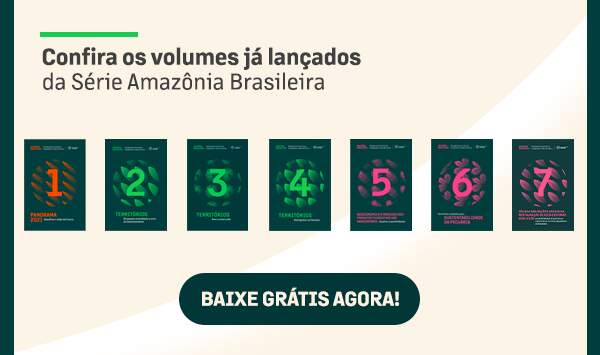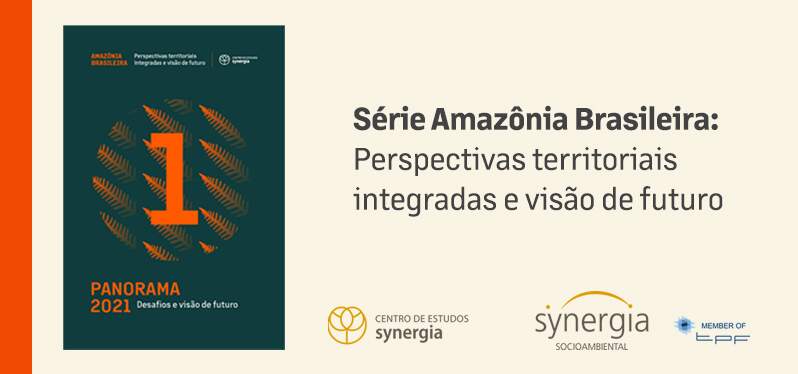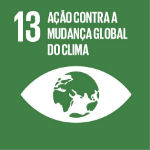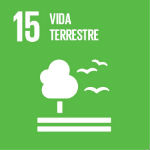Posted in: 11/08/2021

For more than 10 years, Synergia has been strengthening ties with the Brazilian Amazon. By working in projects that aimed to stimulate social development, territorial relations, and to collaborate with knowledge management about the territory, we had the opportunity to learn and exchange knowledge about it, understanding its strengths and weaknesses. For us, acting in a way that promotes transformation, respecting the biome’s characteristics and those of its communities, has always been one of the most important tasks.
The interest in the Brazilian Amazon and its peculiarities made Synergia understand that the main actions aimed at conservation, and to stop degradation, should consider the territory as a whole. And, most importantly, they should unite the public and private sectors and civil society.
Every day there are discussions in the news about how to promote conservation and how to stop deforestation in the Amazon. However, we often feel that knowledge about the territory is not deepened. And, when dealing with a biome that plays a decisive role when we approach the issue of climate change, and how to avoid it, understanding the complexity of the territory is not just a detail: it is the factor that can be the difference between effective actions or actions that are empty of meaning and efficiency.
With this in mind, we have prepared a series of discussions on themes and aspects of the Brazilian Amazon. The initiative seeks to provoke an in-depth conversation between our network of collaborators, partners, clients, and communities about the territory.
The “Brazilian Amazon Series: Integrated Territorial Perspectives and Vision for the Future” aims at learning, exchanging experiences and fostering socio-environmental innovation around the main challenges, opportunities and possible paths for building and achieving a sustainable future vision for the Amazon and Brazil.
To this end, seven volumes have been developed, in which topics such as the economic importance of the territory, its role in controlling climate change, the challenges for its conservation and recovery, and the solutions that can be applied to the biome will be addressed.
In the first volume of the series, “Panorama 2021: challenges and vision of the future for the region“, we offer a reading that locates and problematizes the socio-environmental issues and challenges central to the Amazon, throughout its history and today, as well as a look into the future.

The following volumes will go more deeply into the Amazon territories and challenges, going through the history of their occupation and the different current territorial configurations, resulting from the successes and mistakes of the decisions that guide the management of this vast and complex territory.
In this path, we propose to know more about the anthropized Amazon, the arc of deforestation, the conserved Amazon and the Amazonian metropolises in order to then approach the ecosystem of innovationthat guides new paradigms for sustainability and development: the bioeconomy revolution, the alternatives for sustainable cattle ranching, and the opportunities for productive restoration as possible paths to a new regional and global scenario.
The “Brazilian Amazon Series: Integrated Territorial Perspectives and Vision for the Future” is a production of the recently createdSynergy Study Center, whose goal is to act as an intelligence hub and knowledge connection for the dissemination of concepts and exchange of knowledge relevant to society. To delve into this very important topic, a team was formed with a great deal of knowledge about the territory, acquired during Synergia’s years of operation in the region:
MARIO BRAGA DE GOES VASCONCELLOS
Anthropologist to environmental analyst, with a degree in Social Sciences and specialization in environmental management. He has been active in the Amazon since 2006, having lived there for about five years during this time, in addition to temporary stays in various projects. He worked with the Wajãpi, Guarani, Tikuna, Arara, Kararaô, Xipaya, Guajajara and Awa Guajá indigenous peoples, and developed work in the states of Mato Grosso, Rondônia, Amazonas, Pará, Amapá and Maranhão. His professional experience mixes work in the field of indigenism and environmental consultancy in various projects, such as UHE Belo Monte and Estrada de Ferro Carajás.
LIA LUTZ KROEFF
Graduated in Tourism (PUCRS, 2004) and Geography (UFRGS, 2007) and Master in Environmental Planning (UFRJ, 2010). He has been working in the socio-environmental consulting area since 2005. He has extensive experience in environmental studies and projects in several regions of Brazil. It has already prepared numerous participatory socio-environmental diagnoses and socio-economic diagnoses, including analyzes of socio-economic and institutional indicators and spatial analyses, with the application of geoprocessing techniques.
GABRIELA GOULART OLIVEIRA
Graduated in Environmental Management (USP, 2013) and Master in Biodiversity Conservation and Sustainable Development (ESCAS-IPÊ, 2020). He worked on projects focused on climate governance and management and on the conservation of native forests in the Amazon region through the commercialization of forest carbon credits. Responsible for training leaders for sustainability and accelerating various social businesses. Led or participated in the execution of participatory socio-environmental diagnoses, in the development of projects for social empowerment, environmental education and income generation, in the creation of monitoring systematizations and management of impact indicators for socio-environmental projects.
_______________________________________________________________________
Download Volume 1 | Panorama 2021: challenges and future vision for the region
Download Volume 2 | Territories: Consolidated occupation and arc of deforestation
Download Volume 3 | Territories: Conserved Area
Download Volume 4 | Territories: Metropolis in the forest
Download Volume 5 | Bioeconomy and the Non-Timber Forest Products Market: Challenges and Possibilities
Download Volume 6 | Pathways and challenges to cattle ranching sustainability
Download Volume 7 | United Nations Decade of Ecosystem Restoration 2021-2030 and possibilities of regenerative agriculture in degraded areas of the Amazon


Sign up and receive our news.